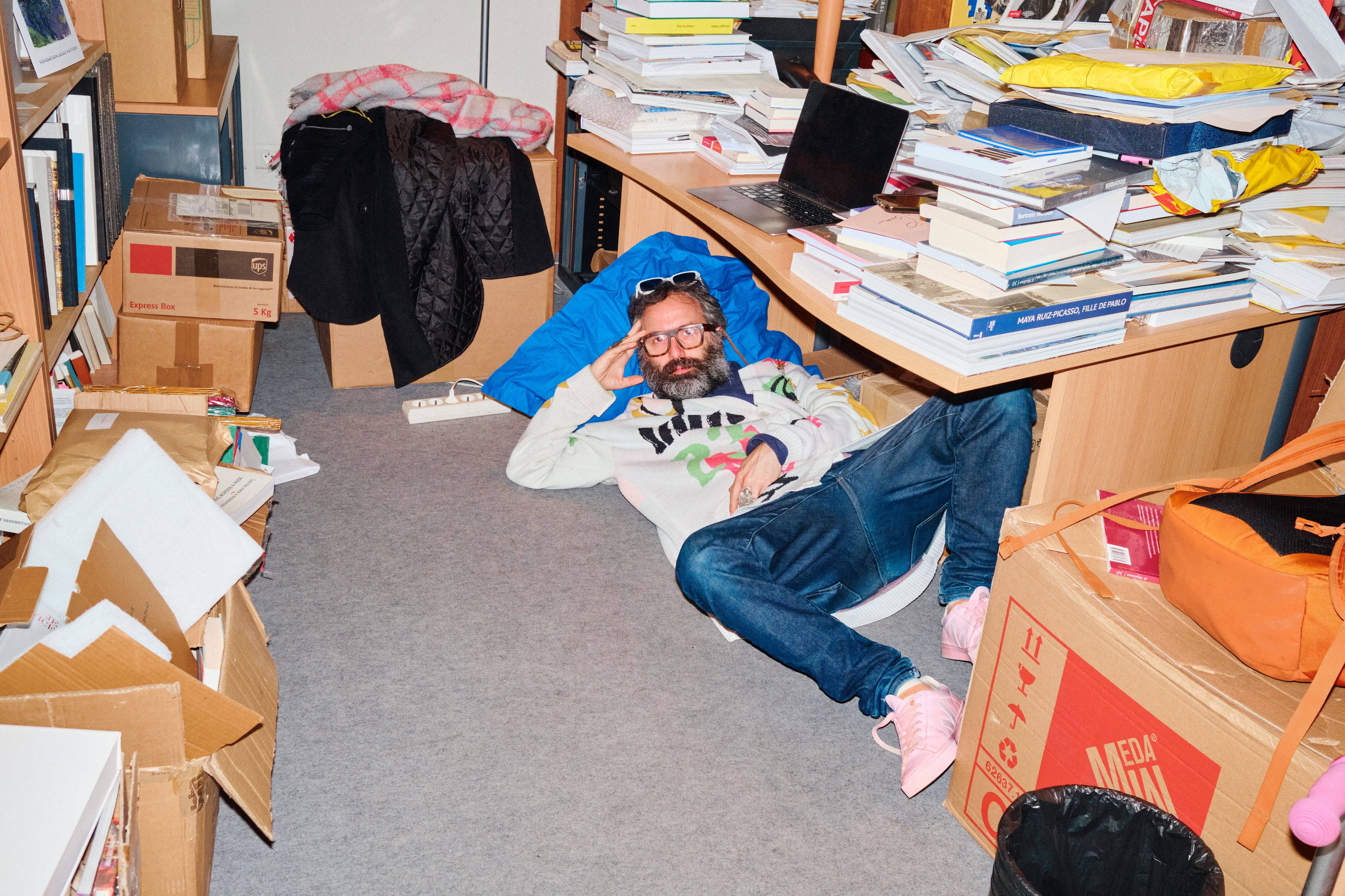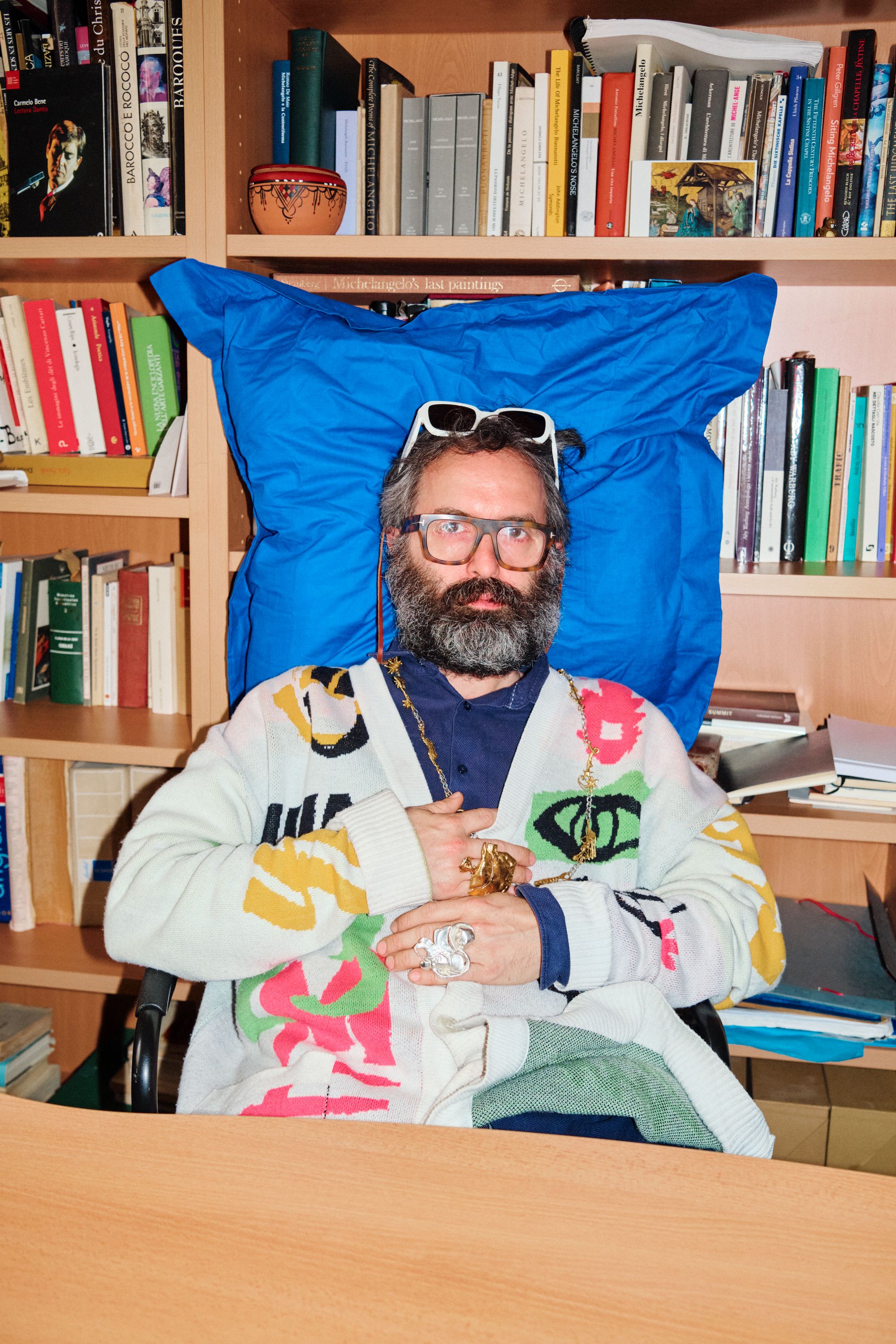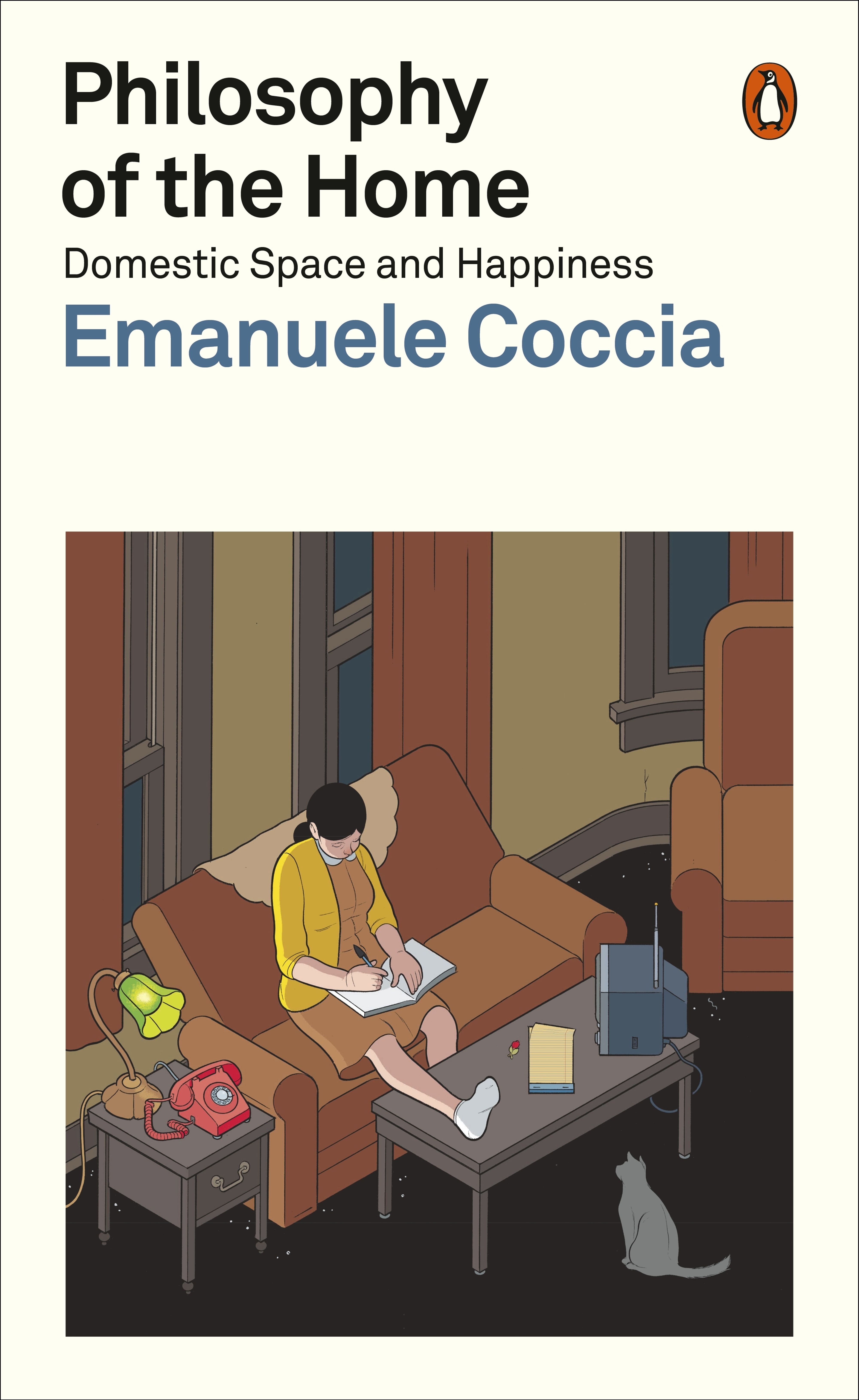
Emanuele Coccia photographed by Lars Brønseth for PIN–UP.

Emanuele Coccia, philosopher and associate professor at the École des Hautes Études en Sciences Sociales, photographed in his office at Paris’s Institut national d’histoire de l’art (INHA) by Lars Brønseth.
Change the design of the home, and you’ll change society? Maybe. Emanuele Coccia would certainly like to find out. What is clear to the Italian author and philosopher is that society is changing but the architecture of our dwellings is not. An associate professor at Paris’s prestigious École des Hautes Etudes en Sciences Sociales, Coccia has also become a resident philosopher of sorts for the culture sector, writing a regular column on “hybridization, plants, objects, and all living things” in French daily Libération and collaborating on projects with artists and creators such as Italian design studios Formafantasma and Dotdotdot, Dutch photographer Viviane Sassen, and former Gucci creative director Alessandro Michele. Coccia’s widely translated Metamorphoses (2020) and The Life of Plants: A Metaphysics of Mixture (2018) consider nature, reproduction, and inter-species flourishing; his Goods: Advertising, Urban Space, and the Moral Law of the Image and Sensible Life: A Micro-ontology of the Image explore human cultural and material production, but never in a bubble. For Coccia, everything is connected, and the author moves as easily between media speak, contemporary artistic discourse, and medieval history — the field in which he began his academic career — as he does between botany and the latest moods in fashion. His most recent work, Philosophy of the Home: Domestic Space and Happiness (first published in Italian in 2021), blends personal experience — of moving house, of loss, of relationships, of material “stuff” — into a theory-backed call for a reevaluation of domestic space as a potential incubator for social and economic change. In his introduction, Coccia notes that, despite ever-increasing urbanization, “none of us really live in a city.” Our experience of the city, he writes, is being mediated by the home — that is where we really “live,” and even the homeless are defined by its absence. Philosophical tradition, he contends, has ignored the home in favor of its urban surroundings. So has the state, maintaining housing as a shelter not only for families and individuals but for arcane systems of oppression and inequality that reflect nothing of our needs. Architecture, per Coccia, has had a hand in this stagnation. To move things forward, he told PIN–UP from his Paris office, we must first examine where we live.

Emanuele Coccia photographed by Lars Brønseth for PIN–UP.

Emanuele Coccia’s book Philosophy of the Home: Domestic Space and Happiness, originally released in Italian in 2021, was published in English by Penguin in spring 2024. Photographed by Lars Brønseth for PIN–UP.
Victoria Camblin: Philosophy of the Home is coming out in English this spring, but since you first published it in 2021, you’ve already been working on a continuation of sorts: a work on chosen families and other alternative relationship models, which you observe through the lens of domestic space.
Emanuele Coccia: In many ways it’s about love — about relationships and identification and all their psychological implications; about the power of love to redefine society. I realized that in order to speak about love, I had to speak about new forms of family — forms you can actually grasp. We see these massive changes through what is happening with the institution of marriage. Family structure is no longer linked to heritage or to genealogy, which means that it isn’t just family that’s changing, it’s the structure of our economy in general. If you cannot pass on what you have through heritage, then property itself makes no sense anymore. If you have to give back what you have when you die, then it’s not “property” — it’s just the right to use something. If your property is just something that coincides with your lifestyle, then it’s not real property in the way we have conceived of it for centuries.
Decouple property and family, love and inheritance, and the whole system changes.
Right. What’s interesting is that “economy,” in Greek, oikonomia, is just an ancient name for the order of the family — household management. Economy and family were the same thing. In a way they still are, we just don’t admit that. The feminist critique of the traditional family is the fact that we don’t acknowledge women’s domestic labor as labor, or the family as a place of work. So what does it mean to think about enterprise beyond property and genealogy? What is the economy of the people?
To take that notion of property further, do you think children, as inheritors, are themselves perceived as commodities — even as luxury ones? I am not referring to Marx or child labor. Today, in affluent settings, the presence of children seems to be codified as a marker of wealth, part of a package that includes the right home, the right goods according to your community — an expression of prosperity.
Exactly. In France, wealthy families have at least four or five children. It is a signifier. In a way, children are the last embodiment of sacred property, something you cannot buy or sell. But the economy around surrogacy and reproductive technology is also evidence that we have acknowledged children as the highest form of commodity, just without addressing or testing it as such. Acknowledging that doesn’t need to be a problem, though. That’s my point. We don’t need to destroy the model; we can just redefine how we see it, and get rid of this lens of genealogy and heritage. Marx said that the issue isn’t an injustice between men and women, but the fact that the man has to be sure about the authenticity of his lineage. The left is trying to adopt an attitude where reproduction is not an economic question. But we have to acknowledge that it is, and not deny that it’s a commodity. Only then can we build another form of economy beyond property, beyond having to own things in order to use them. How can we think of family in this way — as a family version of Airbnb? We don’t need to deny the economic nature of those relationships, we just have to redesign the economy.
This is a nice segue into the built environment of the home, but please tell me there is a model that doesn’t involve a malignant Airbnb-style platform.
My point is that the new left has totally abandoned the perfectly normal Marxist attitude that you do not have to completely deny capitalism and capital. You have to take it and twist it. The idea is not to suspend all economics. Similarly, it makes no sense to condemn a platform economy that could actually be used as an interesting way of overcoming the capitalist view of a traditional asset. We just need a platform economy that is closer to our values.
In your view, is the family a construction site? And is that playing out tangibly in the built environment at all?
There is a huge need to reconstruct, to rebuild the home, which remains a neglected part of architectural theory and practice. Looking back at my own education, all the big architectural texts — Robert Venturi, Denise Scott Brown, and Steven Izenour’s Learning from Las Vegas, Kevin Lynch’s The Image of the City — were about cities. Architects of the last century decided to look at the city as a laboratory. The house was like a black hole. If you think about it, our houses are really primitive. Modernity in domestic space has been attached to devices.
Toasters and microwaves.
It hasn’t been about the space itself or even building techniques. In Paris, we are still living in 19th-century dwellings, which is crazy. We would never ever use anything else that old in our daily lives, but we accept the antiquity because we don’t perceive the violence inherent to this form of domesticity. From that point of view, there is a huge lack of reflection on the need to redefine homes and houses. The few people writing about it are working on a purely theoretical level. I see nothing from the point of view of creative imagination or actual design that considers the types of space that are needed to house this family revolution. You know why Friends was an incredible TV show? Because it put into evidence the fact that we consider family a totally different space. Friends was interesting because it portrayed a home that was no longer linked to genealogy. There were no children there.
Everyone pretty much slept with everyone else in the group eventually, if I recall. At least in all the possible straight combinations.
And they still had to live together afterwards. We do not have a new design for this kind of cohabitation. Even for the visionaries building social housing, the paradigm is still father, mother, children.
I mean you have the Modernist housing solutions — Le Corbusier’s unité d’habitation and so on — where there are common, shared areas. Or does that simply reinforce what you’re talking about, with public spaces being defined and unique in their distinction from private ones?
Those were built 70 years ago. And you have to define individual and common modalities together. Now, especially in the States, everybody’s speaking about polyamory as though it were a full revolution, but it’s not changing a millimeter of the spaces we’re living in.
From what I’ve heard from friends who have attempted that lifestyle, it’s actually a very institutionalized vision, complete with codes and norms and rules that seem to reinforce patriarchal traditions.
It’s a multiplication of the same model. It recreates and reproduces spaces of betrayal.
There’s that term in French, garconnière — the small flat where you take your mistress. Which leads to my next question. You’re talking about how we’re inhabiting these physical, built spaces that are designed in ways that are obsolete. Where are you at with historical preservation? Are you tear-down-and-rebuild or more adaptive re-use?
I’m from Italy, a country that’s been ruined by conservation. In Italy, you never build something new; you have to preserve the heritage. So we end up making ordinary people live in medieval apartments because we think they’re somehow better. With this point of view, you lose both architectural skill and a sense of taste. If you stop building, within the space of two generations you lose the ability to create something that corresponds to the general sensibility, and it’s a tragedy.

Emanuele Coccia photographed by Lars Brønseth for PIN–UP.
You’re not into these informal adaptations where you have ancient buildings with strata of classicism and modern architecture layered on top of them?
Milan is maybe an exception, but if you look at the big cities in Italy, you only see new constructions in the suburbs — cheap, average ones. There is no attempt to rebuild something beautiful and expansive in the city center, which leads me back to Paris.
I cannot handle the pre-Olympics construction and refurbishment hysteria in Paris right now. The doubling down on the city’s identity and its perceived cultural capital — the manic cleaning up of old buildings.
Normally, every single city — Barcelona, London, Munich — has to redefine itself because of the Olympics. So what does it mean to not build in Paris? It means that only a very tiny part of the population can afford to live in the center. It’s extremely expensive, and people who can’t afford it have to live in the suburbs, where it’s also forbidden to build. And the paradox is, why do we love Paris? Because there was a guy named Haussmann who created a new sense of density — this kind of 19th century horizontal skyscraper. Instead of trying to renew that texture and to redefine density on a 21st-century level, they just prefer to restore a building and to make crap in the periphery. Ideas about sustainability and technology have worsened the situation. Everybody’s thinking that construction pollutes. But the pollution is still growing, such that in 30 or 40 years we might not even have enough resources to build. We are condemning future generations to live in ancient cabins built for a kind of humanity that doesn’t exist anymore — an aristocracy that doesn’t exist anymore — when what we need is modern buildings, built in our style.
So you’re tear-down-and-rebuild in the end — just do it for functionality, reform, and accessibility, not to accumulate wealth?
Building doesn’t mean destroying everything. Building means you actually have to deal with the past. People don’t want to do that, so they conveniently say that they are preserving things for historical and environmental reasons and act like that is dealing with it. Architectural culture has adopted this attitude. You can see it in the last couple of Venice Architecture Biennales. People say they are looking at how to live together then proposing these tiny “sustainable” garden houses in the suburbs of major African cities, without anyone addressing the major demographic explosions happening in those centers. If you make everything about cultural preservation and sustainable practice and going back to the land, you’re not addressing any big problems. Architects have a huge responsibility — these massive problems aren’t just for politicians. You can’t ignore the way we live in cities. You can’t just do theoretical work instead of design work. Think about the typology of the villa, a conservative format that hasn’t changed since the Renaissance. No one has tried to imagine how we might innovate even within that existing domestic space.
Shall we end by commiserating about Notre-Dame? The public and private capital that has been invested in that reconstruction — funding from luxury conglomerates like Kering and LVMH, notably, whose brands depend on a certain view of French and Parisian heritage — is so transparent. Paris is hell-bent on preserving its legacy, its luxury image, even though some of its most famous monuments are relatively new. The Eiffel Tower and the Centre Pompidou were flexes of technology and innovation.
The French refused to rethink Notre-Dame. It would improve the tourist tour if you built more! No European capital has been able to develop an architectural language for this century. Relative to cities outside the West, we are living in the past, all the while imagining we are the leaders of the contemporary world. That’s a problem.
